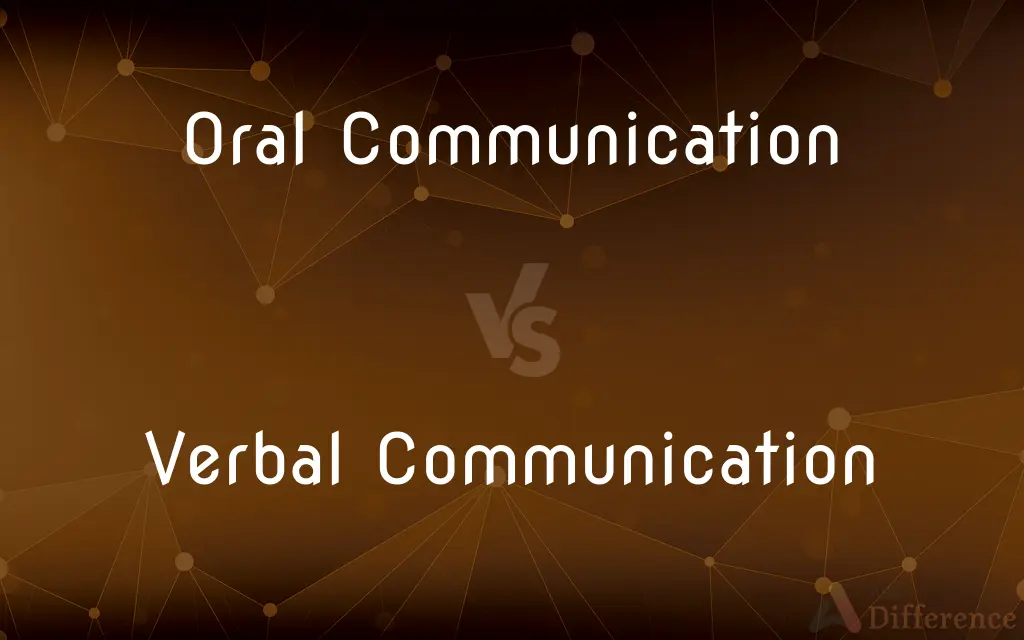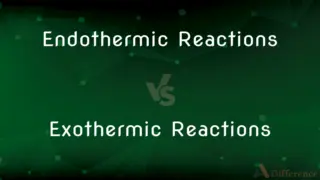Oral Communication vs. Verbal Communication — What's the Difference?
By Tayyaba Rehman — Published on October 7, 2023
Oral Communication refers to expressing ideas via spoken words, while Verbal Communication encompasses both spoken and written words.

Difference Between Oral Communication and Verbal Communication
Table of Contents
ADVERTISEMENT
Key Differences
Oral Communication and Verbal Communication are significant forms of conveying messages and information. Oral Communication specifically implies the use of spoken words for expressing thoughts, ideas, or information and usually involves face-to-face interactions, telephonic conversations, or voice chat over the internet. On the other hand, Verbal Communication is a broader term that includes not only spoken words but also written words, incorporating mediums like emails, letters, and text messages.
Tayyaba Rehman
Oct 07, 2023
Oral Communication can be affected by pronunciation, tone, and clarity of the speaker, and its effectiveness can sometimes be hindered by noise or other disturbances. Verbal Communication, being inclusive of written communication, may face challenges like ambiguity, misinterpretation, and lack of clarity due to insufficient context or information, emphasizing the need for precision and clear expression in both spoken and written forms.
Tayyaba Rehman
Oct 07, 2023
Oral Communication requires the presence of a speaker and a listener, as it is immediate and interactive. It often comes with the advantage of immediate feedback, allowing for clarifications and instant responses. Verbal Communication, however, is more encompassing, and the receiver can be either present or absent. In Verbal Communication, feedback might not always be immediate, especially in the case of written communication, leading to possible delays in response and clarification.
Tayyaba Rehman
Oct 07, 2023
Oral Communication is transient and may lack a permanent record unless it is recorded. It is often more spontaneous and less formal, allowing for more natural and emotional expressions. In contrast, written forms of Verbal Communication can be stored and referred back to, providing a tangible and permanent record of the communication. Written Verbal Communication usually requires more thought and formality, as it can be referenced in the future.
Tayyaba Rehman
Oct 07, 2023
Comparison Chart
ADVERTISEMENT
Interaction
Requires immediate interaction between speaker and listener.
Interaction can be immediate or delayed.
Tayyaba Rehman
Oct 07, 2023
Permanence
Generally lacks a permanent record unless recorded.
Can be transient or permanent, especially in written form.
Tayyaba Rehman
Oct 07, 2023
Formality
Often more spontaneous and less formal.
Can be formal or informal, especially in written form.
Tayyaba Rehman
Oct 07, 2023
Challenges
Pronunciation, tone, clarity, and noise can be challenges.
Ambiguity and misinterpretation can occur in both spoken and written forms.
Tayyaba Rehman
Oct 07, 2023
Definitions
Oral Communication
Oral Communication involves immediate interaction between the speaker and the listener.
The debate showcased the importance of clear and precise Oral Communication.
Tayyaba Rehman
Oct 01, 2023
ADVERTISEMENT
Verbal Communication
Verbal Communication encompasses various forms like speeches, discussions, emails, and letters.
Effective Verbal Communication skills are essential due to their wide application in daily life.
Tayyaba Rehman
Oct 01, 2023
Oral Communication
Oral Communication is often transient, lacking a permanent record unless recorded.
The lecturer emphasized the transiency of Oral Communication, urging attentive listening.
Tayyaba Rehman
Oct 01, 2023
Verbal Communication
Verbal Communication includes the expression of ideas and information using words, both spoken and written.
The teacher used Verbal Communication to explain the complex topic, utilizing both speech and writing.
Tayyaba Rehman
Oct 01, 2023
Oral Communication
Oral Communication is the conveyance of ideas through spoken words.
During the meeting, effective Oral Communication was crucial to understand the presented ideas.
Tayyaba Rehman
Oct 01, 2023
Verbal Communication
Verbal Communication requires precision and clear expression to avoid ambiguity and misinterpretation.
Clear and precise Verbal Communication is pivotal to avoid misunderstandings.
Tayyaba Rehman
Oct 01, 2023
Oral Communication
Oral Communication’s effectiveness depends on the clarity, tone, and pronunciation of the speaker.
The speech was a success due to the speaker's clear Oral Communication.
Tayyaba Rehman
Oct 01, 2023
Verbal Communication
Verbal Communication can be interactive or non-interactive, allowing for immediate or delayed feedback.
Emails are a form of Verbal Communication where feedback is not immediate.
Tayyaba Rehman
Oct 01, 2023
Oral Communication
Oral Communication can be more spontaneous and usually less formal.
Casual conversations typically involve informal and spontaneous Oral Communication.
Tayyaba Rehman
Oct 01, 2023
Verbal Communication
Verbal Communication can provide a permanent record when it’s in written form.
Contracts utilize written Verbal Communication to ensure a tangible and permanent agreement.
Tayyaba Rehman
Oct 01, 2023
FAQs
What is Oral Communication?
Oral Communication is the expression of ideas and information through spoken words.
Tayyaba Rehman
Oct 07, 2023
What does Verbal Communication encompass?
Verbal Communication includes conveying ideas and information through both spoken and written words.
Tayyaba Rehman
Oct 07, 2023
Can Verbal Communication be recorded for future reference?
Yes, especially in written form, Verbal Communication provides a permanent record.
Tayyaba Rehman
Oct 07, 2023
How is feedback received in Oral Communication?
In Oral Communication, feedback is usually immediate, allowing for instant responses and clarifications.
Tayyaba Rehman
Oct 07, 2023
What are the modes of Verbal Communication?
Verbal Communication can be conducted through spoken words, like in conversations and discussions, or through written words, like in emails and letters.
Tayyaba Rehman
Oct 07, 2023
Is Oral Communication more formal or informal?
Oral Communication is often more spontaneous and can be less formal, especially in casual conversations.
Tayyaba Rehman
Oct 07, 2023
Is interaction mandatory in Oral Communication?
Interaction is a key component of Oral Communication, enabling the exchange of ideas and immediate feedback.
Tayyaba Rehman
Oct 07, 2023
Can Verbal Communication lead to ambiguity?
Yes, both written and spoken forms of Verbal Communication can lead to ambiguity and misinterpretation if not clearly expressed.
Tayyaba Rehman
Oct 07, 2023
How does the formality vary in Verbal Communication?
Verbal Communication can be formal or informal, depending on the context and medium, especially in written forms.
Tayyaba Rehman
Oct 07, 2023
What challenges can Oral Communication face?
Oral Communication can face challenges like pronunciation, tone, clarity issues, and disturbances like noise.
Tayyaba Rehman
Oct 07, 2023
How is Oral Communication typically conducted?
Oral Communication usually involves face-to-face interactions, telephonic conversations, or voice chats.
Tayyaba Rehman
Oct 07, 2023
Does Oral Communication require the presence of a listener?
Yes, Oral Communication requires the presence of a listener for immediate interaction and feedback.
Tayyaba Rehman
Oct 07, 2023
Is clarity important in Verbal Communication?
Clarity is crucial in Verbal Communication to avoid ambiguity, misinterpretation, and to provide sufficient context and information.
Tayyaba Rehman
Oct 07, 2023
How does Oral Communication impact informal conversations?
In informal conversations, Oral Communication is typically more spontaneous, expressive, and less formal.
Tayyaba Rehman
Oct 07, 2023
Can Verbal Communication be delayed?
Yes, especially in written form, Verbal Communication can experience delays in interaction and feedback.
Tayyaba Rehman
Oct 07, 2023
Author Spotlight
Written by
Tayyaba RehmanTayyaba Rehman is a distinguished writer, currently serving as a primary contributor to askdifference.com. As a researcher in semantics and etymology, Tayyaba's passion for the complexity of languages and their distinctions has found a perfect home on the platform. Tayyaba delves into the intricacies of language, distinguishing between commonly confused words and phrases, thereby providing clarity for readers worldwide.

















































